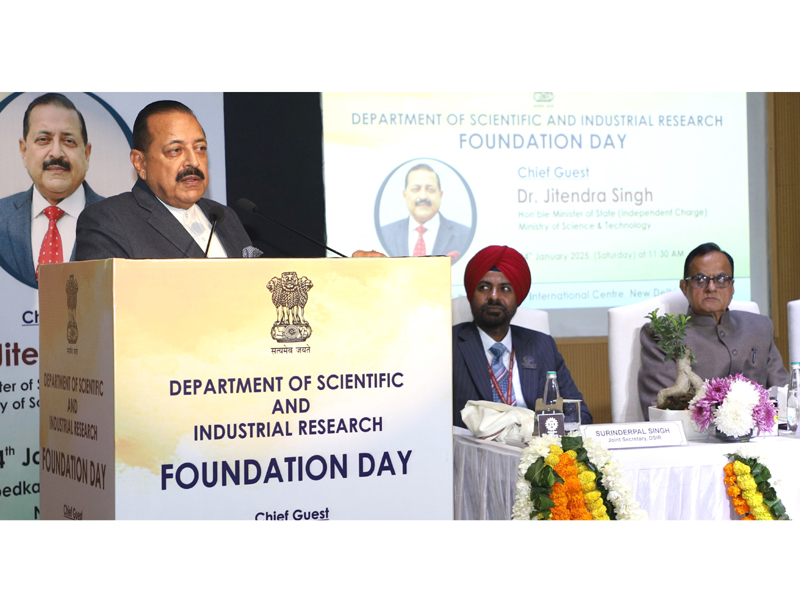‘Modi as a leader in technological advancement’
Excelsior Correspondent
NEW DELHI, Jan 5: During the 40th Foundation Day celebration of the Department of Scientific and Industrial Research at Dr Ambedkar International Centre, Union Minister Dr. Jitendra Singh, who holds the Minister of State (Independent Charge) for Science and Technology, Earth Sciences (Independent Charge), MoS PMO, DoPT Personnel, Public Grievances and Pensions, Atomic Energy, and Space, announced the launch of the first domestically produced “Paracetamol” drug. This initiative is led by the Council of Scientific and Industrial Research (CSIR), which operates under the Ministry of Science & Technology, Government of India.
The Minister elaborated on how CSIR has created indigenous technology for Paracetamol production, a common pain reliever and fever reducer. This innovation aims to enhance India’s self-reliance in Paracetamol manufacturing by minimizing the reliance on imported ingredients, he highlighted.
The Karnataka-based company, Satya Deeptha Pharmaceuticals Ltd, will leverage this innovative achievement to manufacture affordable Paracetamol locally. Currently, India relies on various countries for essential raw materials needed for Paracetamol production. Therefore, the CSIR initiative not only mitigates this dependency but also aligns with Prime Minister Narendra Modi’s vision of “Atmanirbhar Bharat” (self-reliant India).
Dr. Jitendra Singh, in his address, outlined the historical contributions of DSIR over the last decade and recalled its mission to promote synergies with industry partners to enhance innovation and technological advancement. He also reflected on the origins of CSIR, emphasizing its long-standing role in advancing India’s scientific and industrial sectors through research.
He congratulated the DSIR team on their 40th Foundation Day.
The DSIR Foundation Day also marked 16 new technology transfers: 9 from CSIR-CSIO Chennai and 6 from CSIR-CEERI, Pilani, showcasing the collaboration between CSIR and MSME units under the Laghu Udyog Bharati initiative as part of the “100 days 100 technology” campaign. Laghu Udyog Bharati is a nationally registered organization for MSME in India, established in 1994, with over 60,000 registered members. To date, a total of 57 CSIR technologies have been transferred under this campaign, with 16 additional transfers today.
The technologies from CSIO focus on the design and development of scientific and industrial instruments incorporating IoT capabilities, while those from CEERI relate to healthcare and social applications. A Memorandum of Understanding has been signed between CSIO and ELCIA, Bengaluru, to foster collaborative development of sensors.
The Science and Technology Minister also described this moment as celebratory for NRDC and CEL. He pointed out that significant findings often remain unrecognized due to challenges in marketing, despite their potential for successful commercialization.
Speaking on India’s remarkable technological progress in the past decade, Dr. Jitendra Singh credited Prime Minister Narendra Modi’s visionary leadership, describing him as a champion of technological advancement and its application for national benefit.
He emphasized that although India possessed the scientific knowledge prior, it lacked prioritization in innovation and entrepreneurship. Since 2014, significant progress has been made, with government and non-government sectors collaborating on an unprecedented scale. Successes in the space sector serve as evidence, with startups now launching satellites from Sriharikota.
Dr. Jitendra Singh also praised ISRO for the recent SPADEX (Space Docking Exercise) mission, marking India as one of the few countries to achieve this capability.
He stressed the importance of collaboration among all governmental arms and called for a Whole of Government and Whole of Science approach. He revisited initiatives such as One Week One Theme (OWOT) and One Week One Lab (OWOL) from CSIR, both conceived by the Science and Technology Minister. He also acknowledged PM Modi’s commitment to women-led development, indicating that women scientists and startups are receiving necessary support from the government.
Dr. N. Kalaiselvi, Secretary DSIR and DG CSIR, remarked on the signing of the Guwahati science declaration, aiming to establish a global economic hub by 2047.
Prof. A.K. Sood, Principal Scientific Advisor to the Government of India, emphasized the need for India to transition to a product-based economy where a significant portion of the national income derives from technology-related products, drawing a parallel with the USA, where 9% of economic growth is attributed to the tech sector.


Leave a Reply